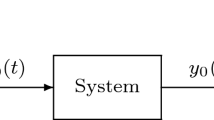Abstract
The input u k and output y k of the multivariate ARMAX system A(z)y k = B(z)u k + C(z)w k are observed with noises: u ob k ≜ u k + ε u k and y ob k ≜ y k + ε y k , where ε u k and ε y k denote the observation noises. Such kind of systems are called errors-in-variables (EIV) systems. In the paper, recursive algorithms based on observations are proposed for estimating coefficients of A(z), B(z), C(z), and the covariance matrix Rw of w k without requiring higher than the second order statistics. The algorithms are convenient for computation and are proved to converge to the system coefficients under reasonable conditions. An illustrative example is provided, and the simulation results are shown to be consistent with the theoretical analysis.
Similar content being viewed by others
References
Box G E P, Jenkins G. Time Series Analysis, Forecasting and Control. San-Francisco: Holden-Day, 1970
Brockwell P J, Davis R A. Time Series, Theory and Methods. 2nd ed. Heidelberg: Springer-Verlag, 2001
Choi B S. ARMA Model Identification. New York: Springer-Verlag, 1992
Hannan E J. The identification of vector mixed autoregressive-moving average systems. Biometrica, 1969, 56: 223–225
Hannan E J. The estimation of ARMA models. Ann Stat, 1975, 3(4): 975–981
Stoica P. Generalized Yule-Walker equations and testing the order of multivariate time series. Int J Control, 1983, 37(5): 1159–1166
Stoica P, Söderström T, Friedlander B. Optimal instrumental variable estimates of the AR parameters of an ARMA process. IEEE Trans Automat Contr, 1985, 30(11): 1066–1074
Stoica P, McKelvey T, Mari J. MA estimation in polynomial time. IEEE Trans Signal Proces, 2000, 48(7): 1999–2012
Claerbout J F. Spectral factorization of multiple time series. Biometrica, 1966, 53(1): 264–267
Lai T L, Ying Z. Recursive selections of estimating algorithms and adaptive spectral factorization. IEEE Trans Automat Contr, 1992, 37(2): 240–243
Wilson G. Factorization of the covariance generating function of a pure moving average process. SIAM J Numer Anal, 1969, 6(1): 1–7
Söderström T. Errors-in-variables methods in system identification. Automatica, 2007, 43(6): 939–958
Chen H F. Recursive identification for multivariate errors-in-variables systems. Automatica, 2007, 43(7): 1234–1242
Chen H F. Stochastic Approximation and Its Applications. Dordrecht: Kluwer, 2002
Anderson B D O, Moore J B. Optimal Filtering, Englewood Cliffs, NJ: Prentice-Hall, 1979
Chen H F. New approach to recursive identification for ARMAX systems, to appear in IEEE Trans Automat Contr, 2010
Author information
Authors and Affiliations
Corresponding author
Additional information
Supported by the National Natural Science Foundation of China (Grant Nos. 60821091, 60874001), and the National Laboratory of Space Intelligent Control
Rights and permissions
About this article
Cite this article
Chen, H. Recursive identification for EIV ARMAX systems. Sci. China Ser. F-Inf. Sci. 52, 1964–1972 (2009). https://doi.org/10.1007/s11432-009-0195-5
Received:
Accepted:
Published:
Issue Date:
DOI: https://doi.org/10.1007/s11432-009-0195-5




